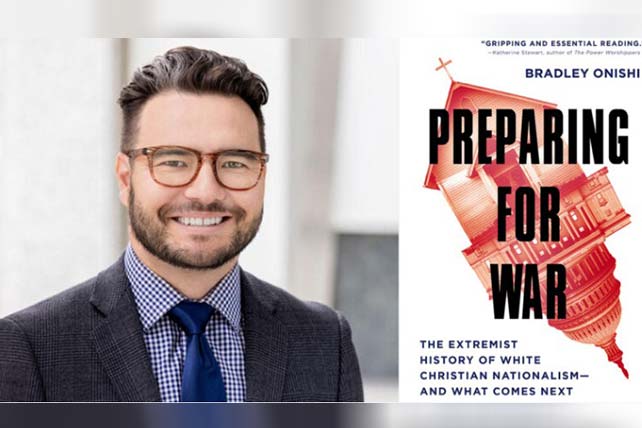(RNS) — Bradley Onishi became a Christian at age 14 when his eighth grade girlfriend invited him to a Bible study at her church in Yorba Linda, California, just south of Los Angeles. Ten years later, he would serve as its youth minister.
Over that decade, he writes in his new book, “Preparing for War: The Extremist History of White Christian Nationalism — And What Comes Next,” Onishi grew to see his faith as less about Jesus and more about perpetuating a certain myth of the United States, one that he says forms the bedrock of white Christian nationalism.
Part memoir, part history of Southern California’s formative role in the rise of the religious right, Onishi’s book traces his growing estrangement from the faith he once zealously championed.
It also examines the Christian nationalist beliefs that he first encountered in Southern California but are now thought to be fueling a movement in Idaho, Montana, Wyoming and in the eastern parts of Washington and Oregon, sometimes called the American Redoubt, where white Christian supremacists are building a refuge.
Onishi, who teaches at the University of San Francisco, also co-hosts with Dan Miller a podcast called “Straight White American Jesus.” Religion News Service spoke to Onishi, who now calls himself a secularist. The interview was edited for length and clarity.
You describe growing up in Yorba Linda and joining Rose Drive Friends Church. Tell me what led you to peel away from church?
There were several events that made me question the either/or logic of my community. We had an in or out, us vs. them approach to morality and politics. When it came to abortion, immigration or scientific research I began to see the world in more subtle ways and it eventually led me out.
In 2005, I left Southern California for the first time to go to Oxford to do a master’s in theology. Once I arrived I was free to explore every avenue I wanted intellectually and politically. Very quickly my life changed.
Which events in particular led you to rethink things?
I remember the 2004 election between George W. Bush and John Kerry. I was determined to vote for Kerry because I thought he was a better candidate. But the elders in my church said if you vote for him you’re voting for the murder of millions of babies. I remember getting into the voting booth and being haunted by that. In my gut, I knew Kerry was a better candidate, but I didn’t want to vote for the murder of children. And I thought, these issues that are so important to the public square, they can’t be reduced like this. There must be ways to discuss this with the subtlety it deserves. This is just too reductive. I’m going to look for other ways to figure this out.
Did you vote for Bush?
Yes. I voted for George W. Bush twice. That’s a very unpopular thing to tell academics at a cocktail party. But I have to be completely honest and tell my story.
Your father is Japanese American from Maui. Did you have a more difficult time as an Asian American?
I learned early on that it was OK to be a person of color at church, but that I should not bring in concerns and issues related to being a person of color. The best way to deal with being an Asian American was to make jokes about it. I realized it wasn’t something that wasn’t going to be a feature of my identity in the community. When I left I had to face up to internalized racism and self-hatred and guilt about how I viewed myself, my family, my history, my culture, my rituals.
Living in the South, I assumed Christian nationalism was birthed here. But I learned from your book that Southern California played a huge role.
There’s no doubt that Christian nationalism has been at home in the South for centuries. But in the middle of the 20th century, millions of white Southerners and Midwesterners left to places like Arizona and Southern California and reshaped the landscape according to their vision. What ended up happening in Orange County is this pure distillation of white Christianity, mixed with vehement American nationalism, a libertarian approach to economics and a strong anti-communism that veered into conspiracy. The Southland, as I call it, became the epicenter of the new right.

